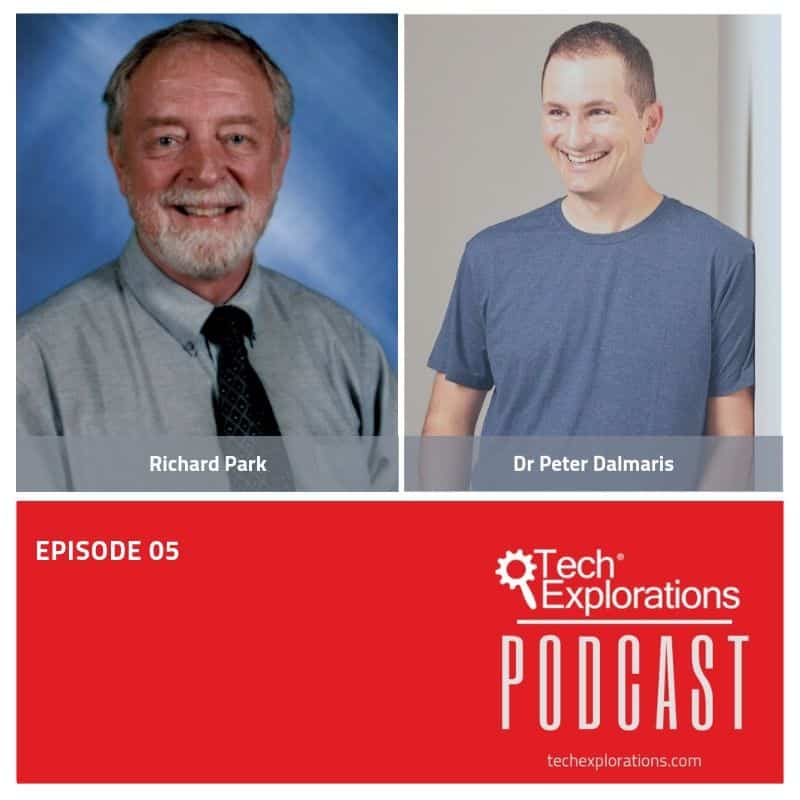[spp-player]

The full video for this interview is available, please check it out.
In this episode, Peter Dalmaris (that’s me!) talks with Richard Park.
Richard has been teaching full time for twenty years. He currently teaches college-level Network Engineering and is creating an “IoT Explorations” course for the coming school year.
Richard also taught Secondary Technology Education, concurrently, for eleven years. In these venues, the topics included coding, operating systems, electronics, and multimedia in addition to networking.
Prior to his full-time teaching career, Richard was a Cisco Systems Network Academy Area Manager, Apple Computer Systems Engineer, Texas Instruments Technical Instructor, and an IBM Mainframe Systems Field Engineer.
At Apple Computer, he designed and implemented the technology infrastructure for the Apple Market Center, a predecessor to today’s Apple Stores, and co-authored the “Apple ][ Primer”, Apple’s first classroom teacher training manual.
Richard holds AAS, BS, and MS degrees in Electronics Technology, Radio and Television Journalism, and Education from Southern Illinois University, and Texas A&M University.
In my conversation with Richard, we touched on a wide array of topics drawing mostly from his vast experience. He worked at Apple Computer for 20 years, at a time where networks were open and unencrypted, and witnessed first hand Apple’s foray into education, and he wrote the Apple ][ Primer, one of the first programming guides for teachers. This discussion reminded me of my first computer, an Apple //e with 128KBytes of RAM.
Richard was one of the first users of Visicalc, one of the first visual spreadsheet programs for the Apple ][ and defined much of how modern spreadsheets work. This knowledge was very useful when he worked at Texas Instruments and essentially revolutionized job costing.
We discussed Richard’s work at the CISCO Academy where he teaches Network Engineering and the course he is developing at the moment, on IoT Fundamentals. In this course that Richard is designing, he combines a Raspberry Pi and Arduino to teach IoT concepts by gradually building an IoT application.
We also had a look at Richard’s adaptation of the Raspberry Pi Full Stack application, which is one of my favorite moments of the conversation.
We talked about Radio Shack, Bill Nye the Science Guy, Mr. Wizard, breadboarding, and, so much more.
I am sure you will enjoy this conversation.
This is Tech Explorations Podcast episode 5 part 2.
The Tech Explorations Podcast is a podcast produced by Tech Explorations, a leading provider of educational resources for Makers, STEM students, and teachers. Go to techexplorations.com to see a complete list of our books and courses covering the Arduino, Raspberry Pi, and electronics.
Show Notes
-
- [spp-timestamp time=”0:00:34″] Richard approach to teaching complicated topics and to starting a new project that has a lot of unknowns in it
- [spp-timestamp time=”0:05:49″] The difference between a mentor and a coach, and the role of the mentor
- [spp-timestamp time=”0:09:31″] What got Richard into electronics and where did Richard get parts during those earlier days?
- [spp-timestamp time=”0:16:18″] Equipping the students with kits
- [spp-timestamp time=”0:19:53″] The responsibility of the teacher is to convert information noise into an ordered curriculum
- [spp-timestamp time=”0:21:24″] Don Herbert, Watch Mr. Wizard

